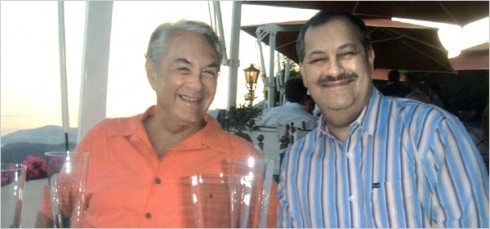CHARLESTON, W.Va. — A series of recordings of Don Blankenship were played Friday at the Charleston Federal Courthouse and Blankenship’s former executive assistant, Sandra Davis was called to testify as the trial of former Massey Energy CEO entered a third afternoon of testimony.
One of the tapes featured Blankenship talking to a woman that the prosecution said he was dating, where he lamented not being appreciated enough, saying at one point, “they treat me horrible. The compensation is not such a big deal. Even in the meeting today they referred to me as a dictator.”
Five recordings were played at the end of the day Friday. The prosecution has said it plans to play more as the trial continues.
In one of the recordings Blankenship complains a now infamous photo of himself and former state Supreme Court Justice Spike Maynard vacationing in the French Riviera is “all over WSAZ.”

Blankenship is also heard bragging to an unidentified woman, whom he had sent flowers, about Massey’s earnings but complaining about his pay saying he couldn’t “buy groceries with (stock) options.”
In another recording, Blankenship was dictating a memo that an assistant would type up later.
“This is a reminder to everyone that the spending of capital before it’s proved is a dischargeable offense,” Blankenship said on part of the tape.
One of Blankenship’s attorneys objected to the playing of each recording but Federal Judge Irene Berger overruled his motions.
Earlier in the day Berger ruled most of the recordings would be allowed to be heard by the jury.
After reviewing transcripts of the recordings, Berger admitted all but three of those recordings into the trial and permitted defense additions to them, argued for because of context, in at least two cases.
In his opening statement, Steve Ruby, assistant U.S. attorney, told the jury they would hear from Blankenship during the trial, in his own words, via those recordings.
Davis, who served as Blankenship’s executive assistant, helped authenticate the recordings saying Blankenship had equipment put into place to record all phone calls. An FBI agent testified how investigators opened them.
In Friday morning testimony, the prosecution called Tyler Childress, an MSHA program analyst, to talk about more than 20 pages of records, focused on a time period between Jan. 2008 and Apr. 9, 2010, that will serve as evidence in Blankenship’s trial.
Repeated objections came from the defense during testimony about those records.
Using data he collected from safety records, Childress told the jury MSHA issued 836 total orders and citations at UBB between January 2008 and April 9, 2010. Of those, 311 were considered substantial and 284 dealt specifically with ventilation.
One of several charts shown to the jury dealt with comparisons of rates of violations per inspection day. From Jan. 1, 2009 to April 9, 2010, the nationwide rate for all underground mines in the U.S. was .86 compared with a rate of 1.38 at UBB.
Blankenship faces up to 30 years in prison if convicted of the three counts he’s facing for alleged conspiracy to violate mandatory mine safety and health standards, making a false statement to the U.S. Securities and Exchange Commission and securities fraud.
The charges are connected to operations at the Upper Big Branch Mine where 29 coal miners were killed in an explosion in April 2010. Blankenship is not charged with causing that explosion.
Friday’s testimony focused on the time of the alleged conspiracy.
Childress compared the number of unwarrantable failure orders at UBB to eight mines of similar production output. In the time period examined, 59 unwarrantable failure orders were recorded at UBB, MSHA records showed. The nearest mine on the list recorded 13, while several had zero unwarrantable failure orders.
Unwarrantable failure orders are characterized as those going beyond ordinary negligence for conduct such as “reckless disregard,” “intentional misconduct,” “indifference,” or “serious lack of reasonable care,” according to MSHA.
Childress was the prosecution’s third witness.
The jury of 11 women and four men, including three alternates, was seated Wednesday. There will be no trial testimony Monday for Columbus Day.
(Shauna Johnson and Matt Maccaro also contributed to this story)

